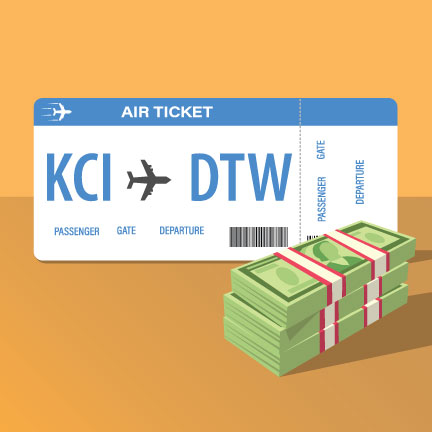
Airline Pricing and Your Wealth
When you book a flight from Kansas City to Detroit, it’s well known that you’d best book the trip as early as possible to get the lowest fare.
For if you have an emergency and have to book a flight the night before your trip, then it may be best to just cover your eyes when clicking ‘Purchase’ because it’s going to cost a small fortune. But did you ever stop to think about how backward that is? If there’s still a seat available the day before the flight, shouldn’t the airline be offering that seat at a deep discount in order to fill the seat with you and their coffers with your money? Otherwise, they’re lifting off with empty seats and underutilized capacity.
It turns out that airlines aren’t stupid. They know that they can train us (and have done so very successfully) to book early and not wait until the last minute. By pushing us to buy early to avoid the most expensive last-minute flights, they can actually charge more for all the flights than they could have if they allowed us to wait and wait to see how little we could pay at the end in order to get on our flight. And not only that, but they get to hold our money for weeks or even months while we await the arrival of our travel date. And during that time, they have some very smart people investing that money we ‘loaned them’ in order to bolster their returns. Brilliant.
In many ways, the investing markets offer a similar opportunity to really smart investors, but we get to be the airline in this case. You see, when we get money in the market early, and keep it in there, our ‘ticket price’ is working for us and not against us as it does when we buy an airline ticket long before that seat would have been sold to someone else. In other words, time is an ally in investing while time is your enemy when playing the airline fare game; that is, unless you’re the airline.
In both scenarios, there’s risk present, always is. Airlines know this, so they offer optional insurance against a change in your plans. If you pay the insurance premium, an illness or emergency doesn’t mean you lose your fare; you can exercise the insurance policy and be made whole again, minus the cost of the insurance. If you don’t need to change your plans, you’re out the insurance cost. In investing, there are all sorts of insurance policies available. Everything from options on stocks to guaranteed annuities or CDs, even diversification into bonds is a form of insurance against unforeseen circumstances threatening your stock position in the market. The downside, of course, is the cost of the insurance. In fact, it can be argued that the best long-term portfolio is 100% stocks. Over very long periods of time, stocks win. But shorten the time horizon, and the risk present in stocks may warrant buying a form of insurance against a stock market emergency or illness that may arise precisely when you need the money.
Whether you’re headed out to see your aunt in Dover or saving for a (hopefully) long retirement, it pays to plan as far in advance as possible. Because life happens though, recognizing the benefits of ‘insurance’ can help to manage risk in such a way that you’re likely to reach your destination eventually and safely, it might just take you a bit longer to do so.
Investment Advisory Services offered through Elevated Capital Advisors, LLC. An SEC Registered Investment Advisor.
This newsletter/commentary should not be regarded as a complete analysis of the subjects discussed. All expressions of opinion reflect the judgment of the authors as of the date of publication and are subject to change. Content provided herein is for informational purposes only and should not be used or construed as investment advice or a recommendation regarding the purchase or sale of any security. There is no guarantee that the statements, opinions, or forecasts provided herein will prove to be correct. Past performance may not be indicative of future results. There is no guarantee that any investment plan or strategy will be successful. All references to potential future developments or outcomes are strictly the views and opinions of the author and in no way promise, guarantee, or seek to predict with any certainty what may or may not occur in various economies and investment markets.

